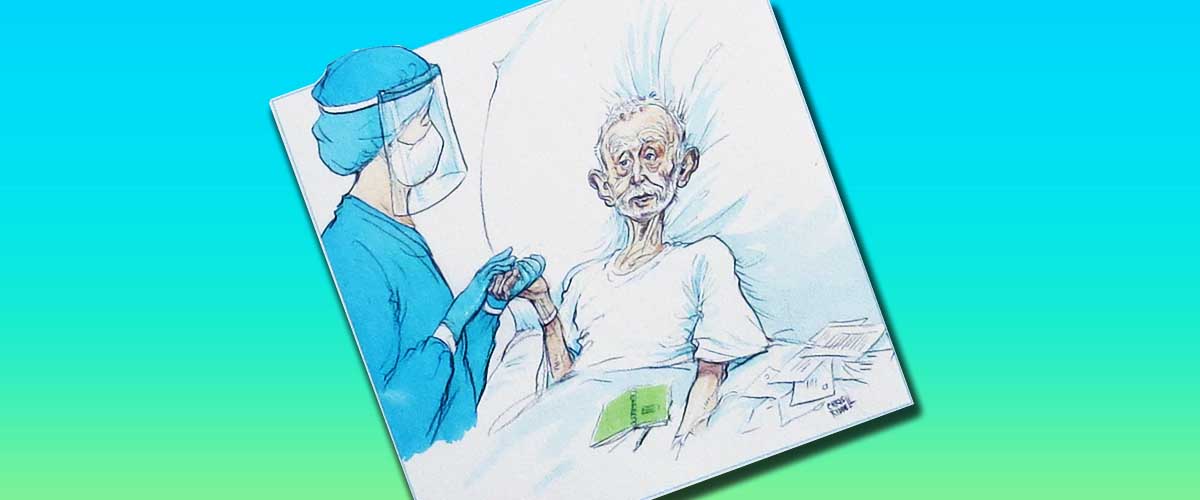A review of Many Different Kinds of Love – a Story of Life, Death and the NHS by Michael Rosen.
Different kinds of writing
I received a copy of Michael Rosen’s Many Different Kinds of Love just before Christmas. An early Christmas present. I read it in about three days in the hiatus between abandoning Anna Burns’ Milkman and taking it up again to finish reading. Sometimes when I read books in parallel I find surprising points of similarity. This time I just felt Michael Rosen’s poems gave me a break from Anna Burns’ style of writing.
This isn’t a review criticising Milkman, which I enjoyed and was impressed by. But I did find it hard going. Long sentences; long, convoluted, labyrinthine expressions of the state of mind of people in the state within a state that was “this side of the road” as opposed to “that side of the road”, in the Northern Ireland of the 1970s. It’s an amazing piece of writing. Amazing in the way it manages to recreate this state of mind in language. But I needed to take a break, and Many Different Kinds of Love gave me the opportunity.

Not that a book of poetry describing Michael Rosen’s near-death struggle with Covid sounds like a barrel of laughs. And it isn’t. (Although there is certainly some humour to be found there.) But it’s very moving and very much more accessible than you might think. Especially if you’re not familiar with Rosen’s poetry.
Michael Rosen, national treasure
In Britain, especially among people who work with children’s education and speech, and parents, and among people who enjoy poetry, he is regarded as a national treasure. He’s published a number of his own books and, anthologising other poets, his published book total is somewhere north of 140 titles. He was the UK’s Children’s Laureate between 2007 and 2009. He has hosted a number of different radio programmes on the BBC focused on poetry. Internationally, I suppose, he may be best known for writing We’re Going on a Bear Hunt. This is a poem and children’s picture book, illustrated by Helen Oxenbury, that has spread around the world. (There’s a link at the end of this post.)
During Covid lockdowns, when families with young children might have been be allowed out of their houses for exercise, but weren’t allowed to mingle with others, many families organised bear hunts inspired by the poem. Wikipedia says “‘bear hunts’ became popular with houses across the United States, Belgium, Netherlands, and Australia placing stuffed bears in windows, in front yards, or on mailboxes for children to look for and find during walks or drives.”

In 2008 when the British National Health Service (NHS) celebrated its sixtieth anniversary, Michael Rosen wrote it a celebratory poem. “These Are the Hands”, was widely shared in the UK.
Unwell
Towards the end of March 2020, when Covid was already beginning to make its mark in Britain, Michael Rosen started to feel unwell. Soon he was struggling to breathe. But at the time many people didn’t really know what symptoms to look out for. Diagnosed over the telephone, he was advised to take paracetamol and rest. Fortunately a neighbour, who was also a doctor, had equipment to test for oxygen saturation in the blood. She helped Rosen’s wife to administer a test and was shocked to find Rosen’s saturation level was 58%. “I had never seen an oxygen saturation this low in someone conscious.”
His family got him to hospital, where he was admitted. After a little while, with his agreement, he was put into an induced coma as the safest way of treating him.
A doctor is standing by my bed asking me if I would sign a piece of paper which would allow them to put me to sleep and pump air into my lungs. "Will I wake up?" "There's a 50:50 chance." "If I say no?" I say. "Zero." And I sign.
Patient Diary
Many Different Kinds of Love is a long poem, or a collection of poems, detailing Rosen’s illness, treatment and recovery. To tell the story fully, the book includes text messages and letters from other people, and – covering the month and a half that he was in an induced coma – there is the Patient Diary kept by the nurses and nursing assistants who cared for him and wrote him messages of encouragement.
It is a moving and life affirming book. And it is an easier read than Milkman, but in some ways it’s not an easy read.
Today I feel stupid. to have caught Covid 19. Dreams of people I know come to mind none of whom caught it. I must have done something stupid.
Michael Rosen didn’t do anything stupid. The same cannot be said of the people at the very top of government in Britain at the time. Stupid is the mildest of several adjectives that come to mind.
Partygate
As I’m writing this, as I am re-reading Many Different Kinds of Love, the media is reporting on Partygate. Drunken parties in the garden of 10 Downing Street, while the rest of the country was following the government’s own rules for a national lockdown.
The British Prime Minister claims rules were never broken. He claims there were no parties. He never attended the parties. That if he did attend them, he certainly didn’t organise or approve of them. OK, he was there, but he didn’t realise they were parties. Because 30 or 40 people standing around in the garden drinking wine and getting falling-over drunk is just the normal working environment at number 10 Downing Street. Apparently.
On 20th May 2020, Boris Johnson’s government issued instructions to the British people not to meet in groups. People were to meet only the people they shared a house with. If out of doors, they could meet no more than one other person at a time while maintaining social distance. Just a couple of hours later, he took part in a drinks party in the garden of 10 Downing Street. Because all those rules were just for the little people. They didn’t apply to him and the people around him.
Keep going and stay strong
On 20th May 2020, Michael Rosen was being helped out of his induced coma. One of the physiotherapists working with him wrote in his Patient Diary. “Yesterday we used the speaking valve on your tracheostomy* for the first time and we could hear your voice … You are making good progress every day. … Keep going and stay strong.”
*A tracheostomy is a surgically created hole (stoma) in your windpipe (trachea) that provides an alternative airway for breathing. Thanks to the Mayo Clinic’s website for this explanation.




